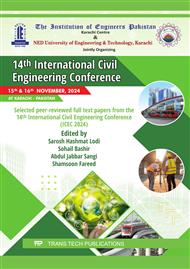p.27
p.43
p.51
p.61
p.73
p.81
p.91
p.101
p.109
Fulfilling Stakeholder Needs and Concerns: A Path to Satisfaction in Construction Projects
Abstract:
Stakeholder satisfaction is a critical determinant of project success in the construction industry. This study explores the factors that contribute to stakeholder satisfaction, focusing on financial performance, communication, sustainability, and operational efficiency. By utilizing a structured survey designed through the Delphi technique, responses were gathered from professionals across multiple countries, ensuring a diverse range of insights. The findings reveal that financial performance is the most significant need, with effective communication and timely stakeholder engagement also being crucial for achieving project goals. Key concerns, such as financial viability, sustainable design, and collaboration, further emphasize the importance of aligning project outcomes with stakeholder expectations. The study highlights the necessity of integrating sustainability and fostering collaborative environments to enhance project efficiency and stakeholder satisfaction. By addressing these factors, project managers can mitigate risks, improve communication, and achieve long-term project viability. This study focuses on understanding and enhancing stakeholder satisfaction in construction projects. It examines the critical factors that influence stakeholder satisfaction, including financial performance, effective communication, sustainability, and operational efficiency. The research encompasses a diverse range of construction projects across multiple countries, providing a comprehensive analysis of stakeholder needs and concerns in different cultural and regional contexts.
Info:
Periodical:
Pages:
73-80
DOI:
Citation:
Online since:
April 2025
Authors:
Price:
Сopyright:
© 2025 Trans Tech Publications Ltd. All Rights Reserved
Share:
Citation:


